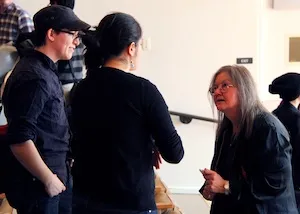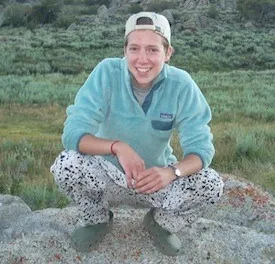Queer and Trans Conference Explores Theme of "Queers at Work"
"What is your work? Who shares your work? Where is your work done? Whom does that work serve? Is your work rewarded or not?"
At the Queer and Trans Conference (QTC) that concluded last week, students, activists, artists, and other attendees attempted to answer these questions, focusing on the theme of "Queers at Work." Aiming to challenge and explore societal conceptions of work, the conference discussed how factors of class, race, disability, and education affect queer people in the workplace.

Award-winning author and activist Dorothy Allison (right) speaks with students after her campus talk, one of the highlights of this year's QTC.
The conference also functions around a broader vision of what Madeleine Reichman '13 terms "radical queer politics." Reichman, one of the members of the QTC planning committee, notes that mainstream society tends to think about queer politics in relation to marriage equality, but that a goal of this year's conference was to highlight issues that are often sidelined within larger discussions.
Camille Robertson '13, another member of the planning committee, stressed that the conference is also based on "a framework of class justice." This year's conference aimed to explore class privilege and its relation to accessibility and discrimination within the workplace. Robertson joined the planning committee in her junior year. After attending the 2010 conference, she was impressed by the goals and purpose of the QTC.
"It's grounded in a pretty particular queer politics and one that I really like that looks to create a much broader, more inclusive movement than mainstream LGBT work," Robertson says.

Camille Robertson '13, a special major in biology and education studies from Williamstown, Mass., says the QTC "looks to create a much broader, more inclusive movement than mainstream LGBT work."
Reichman, an English major and history minor from New York, found herself drawn to the issues of poverty and marginalization after attending a lecture given by disability justice activist Mia Mingus at the 2011 conference. As a new member to the planning committee, Reichman decided to become more involved "in a group that addressed radical queer politics" and found that the QTC offers a keen examination of the complexities of the queer community.
"I feel like [the QTC] does a really good job of including voices and perspectives that are usually marginalized in mainstream LGBT spaces," she says.
This year, the QTC used public art installations to help promote the conference in order to provide a creative and interactive way to engage the community. The emphasis on art is also a way of demonstrating the conference's interests in bringing together academics, activists, and artists.
This mixing of academia and art is a characteristic that appealed to Peera Songkunnatham '15, who managed QTC's website. Songkunnatham, a prospective major in sociology and anthropology from Deerfield, Mass., also coordinated QTC performances by Roots and River Philly Collective. Based in Philadelphia, the group is comprised of queer artists of color and includes former QTC organizer Petra Floyd '12.
"[The QTC] is a place where I feel like there's this energy of really working together to do something meaningful," Songkunnatham said. Intersecting activism and the working experiences of queer and trans people, the conference aims to broaden the conversations surrounding queer politics and move beyond the mainstream ideas of queer and trans peoples.
Since 2008, the QTC has continued the tradition of the Sager Symposium, which was originally supported by Richard Sager '73 in order to promote discussions about issues within the queer and LGBT communities. After a restructuring of the Sager Fund, the Symposium transformed into the current conference, which now is run entirely by students.
For a full list of events and speakers, as well as the conference's history, visit the QTC's website at http://qtc.swarthmore.edu/.



